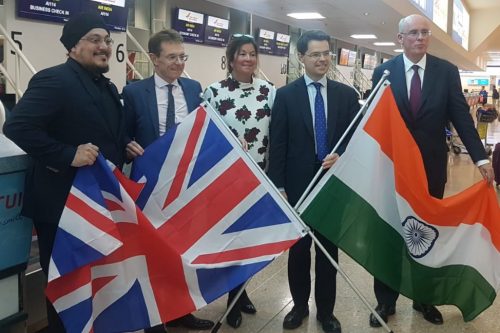Global opportunities should not be lost because of Brexit ‘obsession’

The West Midlands needs to look to opportunities in global markets and not get distracted by the Brexit “obsession” if it is to continue to thrive.

Paul Faulkner, chief executive of Greater Birmingham Chambers of Commerce, argued that the continued uncertainty around a deal has created a resilient approach from business.
“We just don’t know what the impacts are going to be, what the deal is going to be, we don’t know what all the unintended consequences will be – and the chances are there will probably be an awful lot,” he said.
“But there’s an element of ‘let’s get on with it’ and that is what we’re seeing from a lot of businesses.”
The lack of certainty about the UK’s future trading relationship with Europe has meant old Commonwealth networks and new partnerships with developing economies have taken on a greater importance.
Earlier this month, East End Foods director Jason Wouhra joined West Midlands Mayor Andy Street and Midlands Engine minister James Brokenshire and Midlands Engine chairman Sir John Peace on a four-day trade mission to India that took in the key cities of Delhi, Pune and Amritsar.
He said: “The one main observation out of the trip was that we are, at the moment, totally obsessed with Brexit. Okay, rightly so, but actually the world’s not going to stop come the deadline.
“On the trip I don’t think Brexit was mentioned once in four days. The thing that was mentioned is ‘what can you do for us?’
“Let’s not get obsessed about Brexit – I know it is hard not to – but let’s get on with it and make sure that we are successful.”
One factor which has changed, particularly for Birmingham, but also for the wider region, is a change in mindset.

Simon O’Neill
“We have got other ingredients – the workforce that we have here, the diverse industries – but the real difference for me is the ambition that we’re going to get on and do something.”
Prof Kiran Trehan, who specialises in leadership and enterprise development at the University of Birmingham, believes the region is now in a good position to push its case to a global audience.
She said: “We have got some concrete examples of where we are pushing the boundaries internationally in those key sectors.
“We’re not trying to be all things to all people, we are saying we have clarity, we have clear focus and this is the agenda that we’re driving forward.”
West Midlands Combined Authority chief executive Deborah Cadman argued that “the West Midlands needs to see the world as bigger than Europe” and should use its sectoral strengths to deepen trading relationships around the world.
“If you look at the industrial strategy and if you look at our sectoral strengths, it’s around advanced manufacturing and autonomous vehicles, diagnostic life sciences, the modern methods of construction,” she said.
“Those are sectors that are of interest to America, China, India. We need to work with DIT [the Department for International Trade] to say while is all this is going on around Europe which is really impactful, and I don’t underestimate that impact, we need to be quite resolute about accessing those global markets as well.”

Paul Brown, EY
He said: “With the Commonwealth Games, we should start rekindling those Commonwealth relationships – we have around £40bn of exports to the Commonwealth Countries at the moment where the larger export destinations are Australia, Canada, Singapore and India.
“But just remember, whilst UK global exports circa £520bn there is £242bn at stake with the EU at the moment. Go for the rest of the world, but we have got to be careful around what we have at stake with Europe as well.”
Tim Pile, chair of Greater Birmingham and Solihull Local Enterprise Partnership and a self-confessed “glass-completely-full” person, also sounded a note of caution.
He added: “I think the scale of the opportunity is huge and I do think the reality is that the personality – and I use that word quite deliberately – of this region, and the success, and the sectoral capability, will mean that competitively we will be able to perform better than most other cities.
“I’m absolutely convinced that we will compete better and harder, but I think there’s a real danger that at the same time we don’t accept the scale of the headwinds of Brexit and the task ahead of us.”









